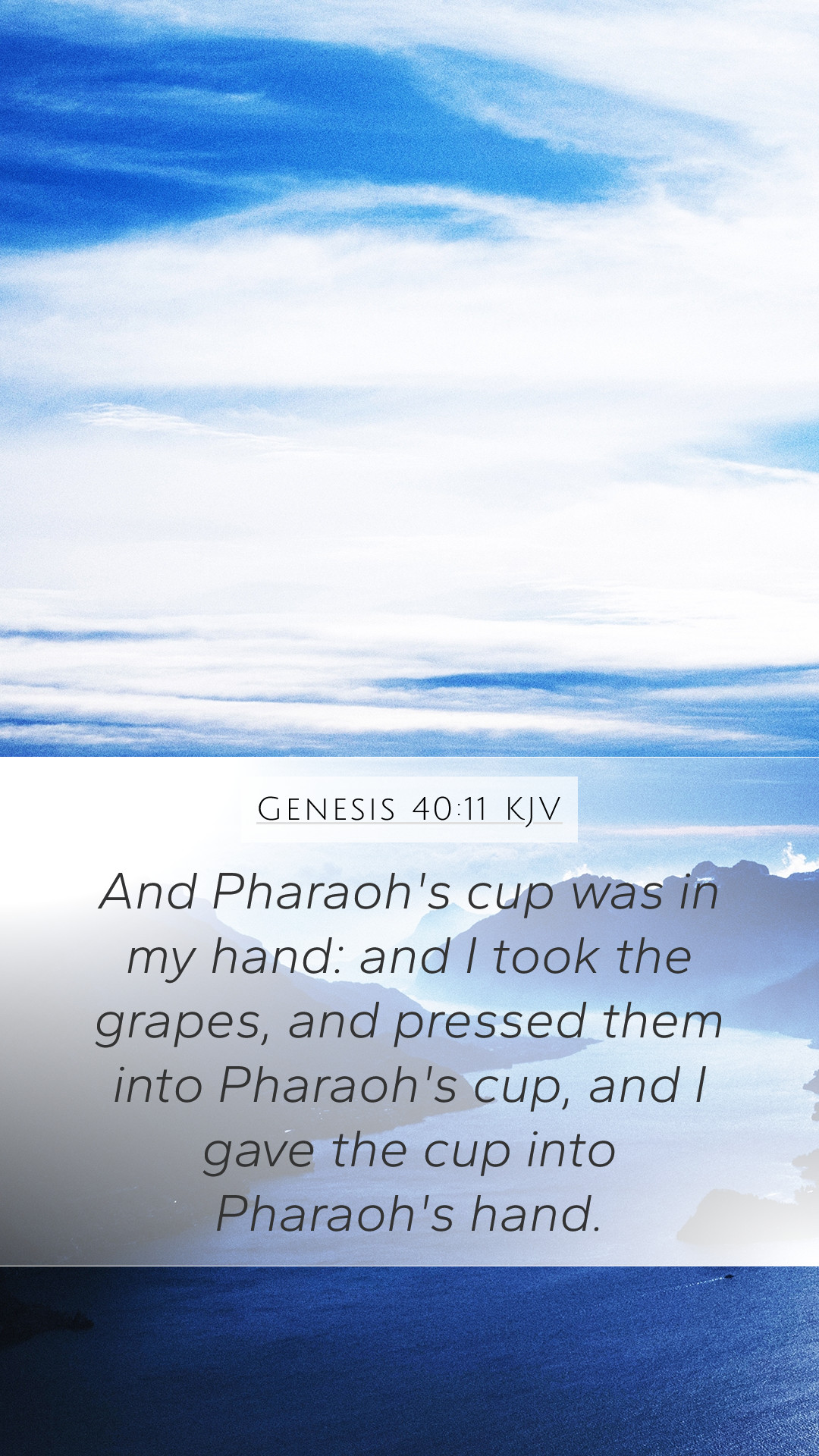Understanding Genesis 40:11
Genesis 40:11 states:
"And Pharaoh's cup was in my hand; and I took the grapes, and pressed them into Pharaoh's cup, and I gave the cup into Pharaoh's hand."
Meaning of Genesis 40:11
This verse is part of the narrative surrounding Joseph's time in prison, where he interprets the dreams of Pharaoh's cupbearer and baker. The cupbearer's dream, which he shares with Joseph, symbolizes restoration and reinstatement into Pharaoh’s favor.
Bible Verse Commentary
Various commentaries shed light on the deeper meanings and insights within this scripture:
-
Matthew Henry's Commentary:
Henry emphasizes the significance of this moment as a turning point in Joseph's life. The act of pressing grapes into the cup signifies service and duty, where the cupbearer's role is to bring pleasure and refreshment to Pharaoh. This reflects God’s providence and Joseph's eventual rise from captivity to prominence.
-
Albert Barnes' Notes:
Barnes interprets the cupbearer's dream as a vivid illustration of hope and restoration. The act of pressing the grapes signifies labor and skill, suggesting that the cupbearer's service is crucial. It represents the idea that through trials, divine purpose is being unfolded.
-
Adam Clarke's Commentary:
Clarke points out the historical and cultural context of the cupbearer's role, explaining that this position was one of trust and intimacy with the king, which further underscores the gravity of the dream's interpretation. The restoration reflects God's mercy and the eventual reconciliation of the cupbearer with Pharaoh.
Key Themes and Insights
This verse encapsulates several key themes that are relevant to anyone seeking deeper understanding:
- Divine Providence: Joseph's ability to interpret dreams demonstrates the sovereignty of God and His control over circumstances.
- Hope and Restoration: The imagery of grapes and the cup signifies hope for the cupbearer, reflecting a broader theme of restoration in the biblical narrative.
- Service and Favor: The transition from imprisonment towards service in Pharaoh’s court signifies the value of faithfulness in small things and how it can lead to greater responsibilities.
Historical Context of Genesis 40:11
This scripture is set within the context of Egypt, where dreams were often seen as significant omens and were carefully interpreted by skilled individuals. Joseph's interpretation comes at a crucial moment that leads not only to his own redemption but ultimately to a position of influence within Egypt.
Application of Genesis 40:11 to Daily Life
The practical applications of this verse can extend to various aspects of life:
- Understanding that trials can lead to divine opportunities.
- Recognizing the importance of serving others faithfully in our current roles.
- Believing in the hope of restoration, even in seemingly dire circumstances.
Bible Cross References
Related verses that further illuminate the understanding of Genesis 40:11 include:
- Genesis 41:9-13 - The cupbearer's recollection of Joseph.
- Genesis 45:5-8 - Joseph’s explanation of his journey towards God's greater purpose.
- Jeremiah 29:11 - God's plans for hope and restoration.
Conclusion
In summary, Genesis 40:11 serves as a powerful reminder of God's providential care and the hope and restoration that can emerge from our trials. Through studying this verse, we gain insight into God’s intention for our lives and the critical importance of understanding Scripture as a whole. For those involved in Bible study groups or utilizing Bible study tools, exploring such passages can enrich one’s spiritual journey.
By diving into the biblical exegesis of verses like Genesis 40:11, we can foster a deeper relationship with the text, apply its insights to our lives, and share these findings within our online Bible study communities.


